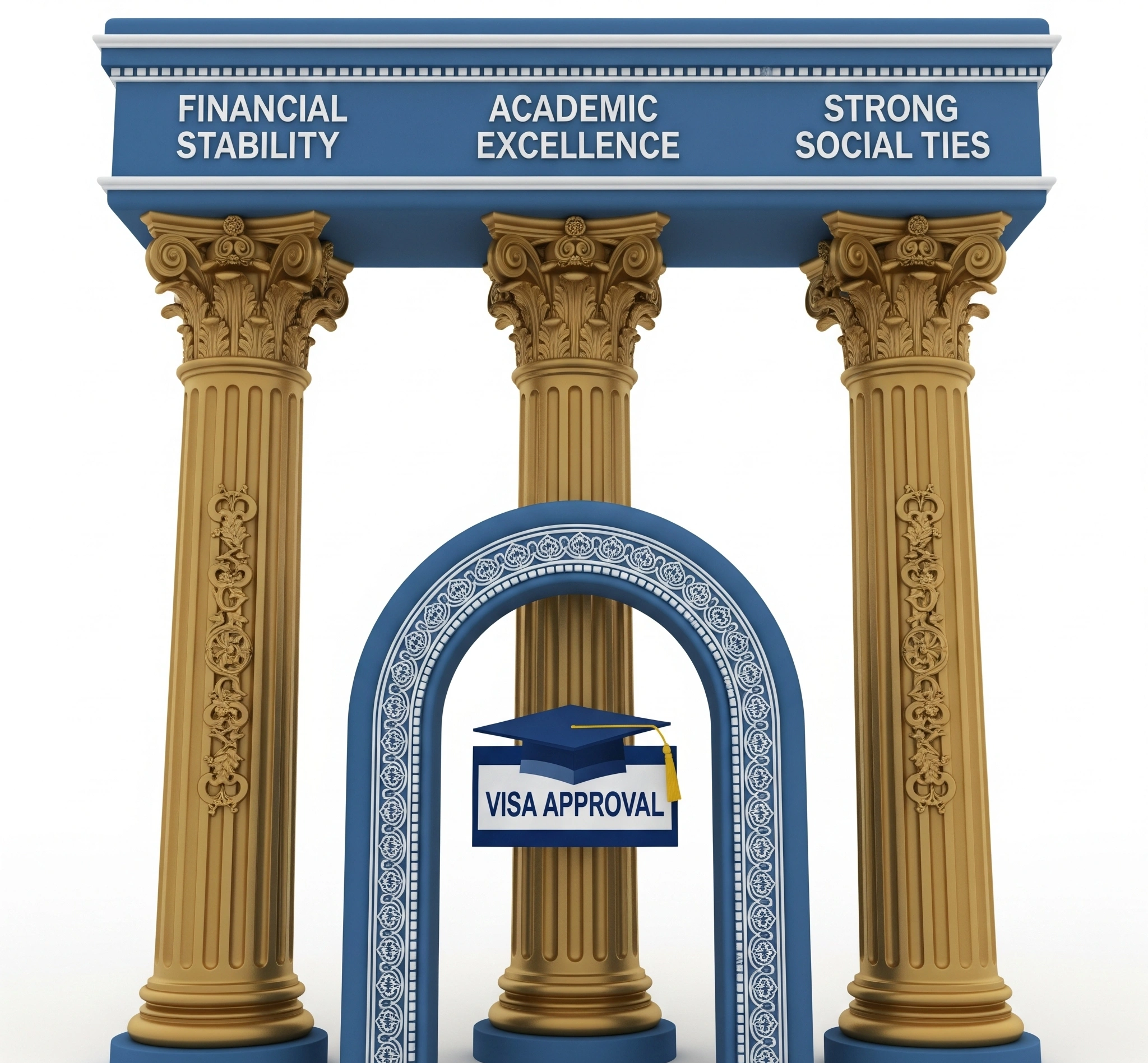
The Black Box of Bureaucracy
You did it. The acceptance letter, shimmering on your screen, is a testament to years of hard work. A wave of excitement washes over you as the dream of studying overseas becomes a real possibility. However, this joy is often fleeting. A cold, creeping anxiety quickly replaces it. Between you and your dream campus lies a major hurdle: the student visa application.
For most first-time applicants, the visa process feels like a black box. It’s a maze of confusing forms, exact financial requirements, and the nerve-wracking prospect of an interview where an officer can decide your entire future in minutes. The internet is full of checklists and horror stories, which only creates more confusion and fear. So, what do they really want? What’s the secret password?
As an international education consultant who has spent years designing visa strategies, I can tell you there is no secret password. But there is a core logic—a master key that unlocks the entire process. Most students fail not because they miss a document, but because they fundamentally misunderstand the question they need to answer. This guide will clarify that question and provide you with an architectural blueprint to build an undeniable, successful case.
Deconstructing the Core Architecture: The Visa Trinity
At its heart, every student visa application, regardless of the destination country, rests upon three essential pillars. I call this “The Visa Trinity.” A consular officer must be thoroughly convinced on all three points. In other words, strength in two pillars cannot compensate for a weakness in one.
- Academic Legitimacy: First, are you a genuine student? You prove this with your official letter of acceptance, academic transcripts, and language proficiency scores. The officer looks for a logical progression where your past studies and future ambitions clearly align with the program you’ve chosen.
- Financial Solvency: Second, can you support yourself? This pillar is about cold, hard numbers. You must provide clear, verifiable proof—through bank statements, scholarship letters, or sponsorship documents—that you can cover your tuition and living costs without working illegally.
- Non-Immigrant Intent: Finally, do you intend to return home? This is the most crucial, most misunderstood, and most common point of failure. The officer must believe that you have strong, compelling reasons (social, economic, and familial ties) to leave their country after you complete your studies.
Most applicants focus almost exclusively on the first two pillars. However, the strategic applicant understands that the third pillar, “Non-Immigrant Intent,” is the very foundation of a successful application.
Understanding the Implementation Ecosystem: The Consular Mindset
To build a successful application, you must first understand the mindset of the person who will review it. A consular officer’s primary job is not to help your education; their job is to enforce their country’s immigration laws.
This means their default position is professional skepticism. In fact, under laws like U.S. Immigration Section 214(b), the law requires them to assume every visa applicant intends to immigrate permanently until the applicant proves otherwise.
This isn’t personal; it’s procedural. Their training teaches them to spot inconsistencies, assess risk, and protect their borders. Because they review hundreds of applications, they have a keen eye for red flags:
- Inconsistent narratives: Your application form says one thing, but your interview answers suggest something else.
- Dubious financial documents: Large, unexplained last-minute deposits into a bank account.
- Vague future plans: You lack clear, specific career goals back in your home country.
- Choosing an illogical program: You apply for a degree that has no clear connection to your academic or professional background.
Your job is not to passively ask for a favor; your job is to be a proactive “trust-builder.” You must provide a clear, consistent, and verifiable narrative that systematically overcomes their doubt and proves you are a low-risk, genuine student who will follow the visa rules.
Project Simulation (Siti’s “Ties to Home” Misstep)
Let’s walk through a common scenario. “Siti,” a bright student from my hometown of Depok, has received acceptance into a Master’s in Data Science program in the United States. She diligently prepares her F-1 visa application.
The First Draft (The Common Mistake)
While Siti’s academic and financial pillars are strong, her “Ties to Home” pillar is weak. In her application, she describes her career goals vaguely:
“After completing my Master’s in Data Science, I hope to leverage my skills in the global technology industry to build a successful career.”
To a consular officer, this statement is a major red flag. “Global technology industry” sounds generic and could easily mean Silicon Valley. As a result, it signals an intent to stay in the U.S. to find work, which directly challenges the principle of non-immigrant intent.
The Strategic Revision (The “Arsitek Digital” Method)
We build a new strategy for Siti, focusing on explicitly proving her “Ties to Home.”
-
- Refine the Narrative: First, Siti revises her statement to be specific and anchored in her home country.
“My goal is to return to Indonesia to apply my data science expertise to the rapidly growing fintech sector. Companies like Gojek and Traveloka are generating massive datasets, but there is a shortage of talent with advanced skills in machine learning models, which this specific program at [University Name] excels in teaching. Therefore, my degree will directly prepare me for a Data Scientist role within this high-growth Indonesian industry.”
- Gather Supporting Evidence: Next, to back this up, she secures a “letter of intent” from a mid-sized Indonesian tech company. The letter states they are interested in interviewing her upon her return with this specific qualification.
- Document Economic Ties: Finally, she includes supplementary documents showing her family owns property in Depok and has deep roots in the community.
The change is profound. She is no longer just a good student; she is now a strategic investment for Indonesia who *requires* this specific U.S. education to achieve her goals *back home*.
The Doctrine of Non-Immigrant Intent
Siti’s story clarifies the single most important concept in the student visa process: The Doctrine of Non-Immigrant Intent.
This doctrine is the philosophical core of your application. Every document you submit, every form you fill out, and every question you answer in your interview ultimately filters through this one lens. The consular officer constantly asks: “Is this person’s primary purpose to study temporarily and then leave, or is studying a means to an end—that end being permanent immigration?”
This is the “one question that truly matters.” Most students mistakenly believe their task is to prove they are a worthy student. However, that’s only part of the puzzle. Your real, more difficult task is to prove you are a temporary visitor. This “Aha!” moment should change your entire approach. For example, your financial documents must prove stability at home, your academic plan must serve a career at home, and your family ties must be your anchor to home. Once you understand that you are building a case for your eventual departure, the entire process becomes clearer and far less intimidating.
The 3-Pillar Trust Framework
To systematically build a case that satisfies the Doctrine of Non-Immigrant Intent, you must build an application based on trust. Here is the framework to do it.

1: Architecting Financial Solvency
Your goal is to prove you are a low financial risk. Therefore, show a history of stable funds, not just a last-minute snapshot. You must also clearly document the source of all funds with notarized affidavits and proof of income, especially if sponsored. Above all, organize everything impeccably.
2: Architecting Academic Legitimacy
Your goal is to prove you are a serious, dedicated student. For this reason, you should articulate in detail why you chose this specific university and program. Demonstrating proactive learning is also key. For example, showing you’ve already explored and compared learning platforms in a Coursera vs edX analysis for 2025 and completed relevant courses can be a powerful signal of your dedication.
3: Architecting Social & Economic Ties (The ‘Return Ticket’ Pillar)
Your goal is to prove you have more to gain by returning home than by overstaying. To do this, document everything: property, investments, and family responsibilities. A letter of intent to interview from a home-country employer is gold. Most importantly, craft a “Return Narrative” with career goals that are specific to your home country’s job market.
From Applicant to Trusted Visitor
The student visa process is the final gateway on your journey to studying abroad. It is, by design, a rigorous process. But it is not an arbitrary black box; it is an architectural challenge. By shifting your mindset from a nervous document-submitter to a confident “trust-builder,” you transform the entire dynamic.
You are no longer just asking for permission to enter. Instead, you are presenting a compelling, evidence-based case that demonstrates you are a legitimate student with a clear purpose and every intention of returning home. When you build your application on the solid pillars of trust, you don’t just get a stamp in your passport—you earn the right to the incredible journey that awaits.
Written by Sang Arsitek Digital, an international education consultant with 15 years of experience, including previous work within consular operations. He specializes in architecting visa application strategies that align with the core principles of immigration law, successfully guiding hundreds of students from places like Depok to their dream universities. Connect on LinkedIn to continue the conversation.
